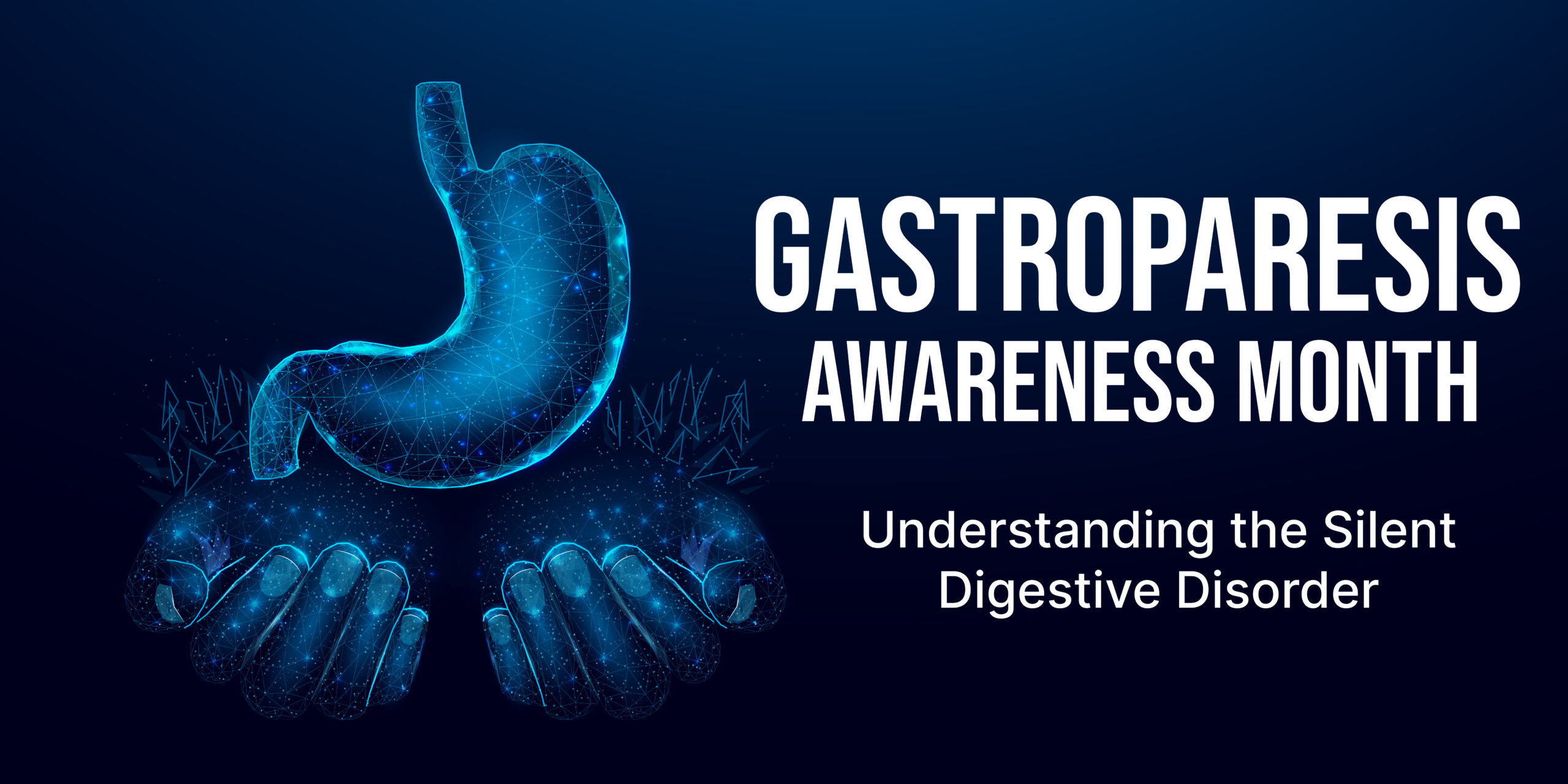
Gastroparesis Awareness Month: Understanding the Silent Digestive Disorder
Gastroparesis Awareness Month, observed every August, highlights a silent digestive disorder that often goes undiagnosed, affecting thousands of people’s stomach function and overall gut health. Gastroparesis occurs when stomach muscles fail to move food properly into the small intestine, causing delayed gastric emptying. This can result in symptoms like nausea, vomiting, bloating, early fullness, and abdominal pain, along with nutritional deficiencies. Founded in 2016 by the International Foundation for Gastrointestinal Disorders (I.F.F.G.D.), the initiative aims to educate the public, support patients, and promote research.
The campaign stresses that gastroparesis symptoms are often mistaken for other digestive issues, delaying diagnosis and treatment. Those affected may face gastrointestinal discomfort, reduced physical activity, and lower quality of life. By raising gastroparesis awareness, encouraging early diagnosis, and promoting effective gastroparesis treatment, the initiative helps patients, caregivers, and healthcare providers recognize warning signs, adopt proper gastroparesis management, and make lifestyle changes to support healthier digestion and better daily living.
What is Gastroparesis?
Gastroparesis is a digestive condition where the stomach muscles do not contract properly, slowing the movement of food from the stomach to the small intestine. Normally, stomach muscles push food into the intestine for digestion, but in gastroparesis, this process is delayed.
This slowed gastric emptying can cause uncomfortable gastroparesis symptoms like nausea, vomiting, bloating, and abdominal pain, affecting daily life. Understanding gastroparesis causes and recognizing these signs early is essential for proper gastroparesis management and treatment.
Symptoms of Gastroparesis
The symptoms of gastroparesis can range from mild discomfort to more severe digestive issues, making daily life challenging. Common gastroparesis symptoms include:
- Nausea and vomiting – Feeling sick or throwing up after meals.
- Early satiety – Feeling full quickly even after eating a small amount of food.
- Bloating and abdominal pain – A heavy or swollen feeling in the stomach area.
- Loss of appetite and weight loss – Reduced desire to eat, which can lead to unintentional weight loss.
- Heartburn or acid reflux – A burning sensation in the chest or throat after eating.
Many of the gastroparesis symptoms overlap with other digestive conditions, which can delay diagnosis. Early identification is vital for effective gastroparesis management, appropriate gastroparesis treatment, and protecting overall digestive and gastrointestinal health.
Gastroparesis Causes and Risk Factors
Several factors can increase the likelihood of developing gastroparesis. Understanding these gastroparesis causes can help in early recognition and management of the condition.
- Nerve damage – Damage to the vagus nerve, which controls stomach muscles, is a common factor. This can occur due to diabetes and gastroparesis or after certain surgical procedures.
- Medical conditions – Chronic illnesses such as diabetes, autoimmune disorders, and neurological conditions can contribute to delayed stomach emptying.
- Medications – Some drugs, including strong painkillers and certain antidepressants, may slow gastric motility, increasing the risk of gastroparesis.
- Unknown causes – In some cases, the exact reason remains unclear, a situation referred to as idiopathic gastroparesis.
Being aware of these risk factors for gastroparesis is essential for early diagnosis and proper gastroparesis management, which can improve quality of life and digestive health.
How is Gastroparesis Diagnosed?
Doctors typically begin the gastroparesis diagnosis process with a detailed physical examination and a thorough review of gastroparesis symptoms. Confirming the condition often requires specific tests to assess stomach function and rule out other digestive disorders.
- Gastric emptying test – This study measures how quickly food moves from the stomach into the small intestine, helping evaluate delayed gastric emptying.
- Endoscopy or ultrasound – These imaging tests detect any blockages, structural problems, or abnormalities in the digestive tract.
- Smart pill test – A capsule device that travels through the digestive system to track how food moves through the stomach and intestines.
Early gastroparesis detection is essential to prevent complications such as malnutrition, dehydration, and long-term digestive issues. Timely diagnosis allows for effective gastroparesis management and improves overall gastrointestinal health.
Treatment Options for Gastroparesis
While there is currently no permanent cure for gastroparesis, effective gastroparesis treatment can help manage symptoms and improve daily quality of life. A combination of lifestyle changes, medications, and advanced interventions is often used.
Lifestyle and Diet Changes
- Eat smaller, more frequent meals throughout the day to reduce stomach workload.
- Opt for soft, well-cooked, or liquid foods that are easier to digest.
- Avoid high-fat and high-fiber foods, as they can slow gastric emptying. Following a proper gastroparesis diet plays a crucial role in symptom management.
Medications
- Prokinetics help stimulate stomach muscles to move food more efficiently.
- Antiemetics reduce nausea and vomiting, common gastroparesis symptoms.
- Antibiotics may be prescribed in cases of bacterial overgrowth affecting digestion.
Advanced Treatments
- Gastric electrical stimulation involves a small device that helps the stomach contract and move food.
- Feeding tubes may be necessary in severe cases where oral intake is insufficient.
- Surgery is rarely required but can be considered when other treatments fail.
While there is currently no permanent cure for gastroparesis, effective gastroparesis treatment can help manage symptoms and improve daily quality of life. A combination of lifestyle changes, medications, and advanced interventions is often used.
Living with Gastroparesis
Living with gastroparesis can present significant challenges for many patients. Daily activities like meal planning, maintaining energy levels, and managing emotional health can be difficult due to the symptoms of this digestive disorder. Following proper digestive health tips and working closely with healthcare professionals can make a meaningful difference in quality of life.
Support systems play a key role in living with gastroparesis. Collaborating with dietitians ensures a personalized gastroparesis diet and nutritional guidance. Joining support groups allows patients to share experiences, gain emotional encouragement, and learn practical strategies for symptom management. A reliable healthcare team provides ongoing monitoring and medical care to manage symptoms effectively. Family and friends also contribute to emotional wellbeing, helping patients cope with the challenges of this chronic digestive condition.
Prevention and Long-Term Management
Although fully preventing gastroparesis may not always be possible, taking steps to manage risk factors can significantly reduce complications and improve quality of life. Proper long-term gastroparesis management focuses on controlling underlying conditions, monitoring symptoms, and maintaining healthy lifestyle habits.
Key strategies for effective gastroparesis care include:
- Controlling diabetes through proper medication, regular blood sugar monitoring, and a balanced diet to prevent nerve damage that affects stomach function.
- Reviewing medications with your doctor to identify drugs that may slow digestion or worsen symptoms.
- Maintaining hydration and a balanced diet, including small, frequent meals that are easier to digest, while avoiding high-fat and high-fiber foods.
- Attending regular medical check-ups to monitor progress, adjust treatments as needed, and detect complications early.
By following these practices, patients can reduce the risk of worsening symptoms, support digestive health, and manage gastroparesis effectively over the long term.
Raising Awareness During Gastroparesis Awareness Month
Awareness months play a vital role in educating the public, reducing stigma, and encouraging timely diagnosis and treatment. Gastroparesis Awareness Month provides an important opportunity for healthcare providers, communities, and individuals to come together and highlight this often-overlooked digestive condition.
During this month, efforts focus on increasing gastroparesis awareness by:
- Sharing accurate information about gastroparesis, including symptoms, causes, and management strategies, to help the public recognize warning signs early.
- Supporting patients in effectively managing their symptoms through guidance on diet, lifestyle changes, and medical care.
- Promoting research to improve treatment options and long-term outcomes for those affected by this chronic digestive disorder.
By participating in these initiatives, we can enhance digestive disorder education, reduce misconceptions, and empower patients to seek timely care and maintain a better quality of life.
Conclusion
Gastroparesis is a silent digestive disorder affecting thousands worldwide, often causing discomfort and nutritional challenges. With proper gastroparesis management, lifestyle changes, and timely medical care, patients can control symptoms and improve their quality of life. Early detection and consistent follow-up are essential to prevent complications and support long-term digestive health. This Gastroparesis Awareness Month, it is important to educate communities, share gastroparesis facts, and raise digestive health awareness, empowering people to recognize symptoms early, seek proper care, and adopt healthier habits that promote a well-functioning digestive system for a better overall quality of life.
Sources
Living with Gastroparesis
Living with gastroparesis can present significant challenges for many patients. Daily activities like meal planning, maintaining energy levels, and managing emotional health can be difficult due to the symptoms of this digestive disorder. Following proper digestive health tips and working closely with healthcare professionals can make a meaningful difference in quality of life.
Support systems play a key role in living with gastroparesis. Collaborating with dietitians ensures a personalized gastroparesis diet and nutritional guidance. Joining support groups allows patients to share experiences, gain emotional encouragement, and learn practical strategies for symptom management. A reliable healthcare team provides ongoing monitoring and medical care to manage symptoms effectively. Family and friends also contribute to emotional wellbeing, helping patients cope with the challenges of this chronic digestive condition.
Prevention and Long-Term Management
Although fully preventing gastroparesis may not always be possible, taking steps to manage risk factors can significantly reduce complications and improve quality of life. Proper long-term gastroparesis management focuses on controlling underlying conditions, monitoring symptoms, and maintaining healthy lifestyle habits.
Key strategies for effective gastroparesis care include:
- Controlling diabetes through proper medication, regular blood sugar monitoring, and a balanced diet to prevent nerve damage that affects stomach function.
- Reviewing medications with your doctor to identify drugs that may slow digestion or worsen symptoms.
- Maintaining hydration and a balanced diet, including small, frequent meals that are easier to digest, while avoiding high-fat and high-fiber foods.
- Attending regular medical check-ups to monitor progress, adjust treatments as needed, and detect complications early.
By following these practices, patients can reduce the risk of worsening symptoms, support digestive health, and manage gastroparesis effectively over the long term.
Raising Awareness During Gastroparesis Awareness Month
Awareness months play a vital role in educating the public, reducing stigma, and encouraging timely diagnosis and treatment. Gastroparesis Awareness Month provides an important opportunity for healthcare providers, communities, and individuals to come together and highlight this often-overlooked digestive condition.
During this month, efforts focus on increasing gastroparesis awareness by:
- Sharing accurate information about gastroparesis, including symptoms, causes, and management strategies, to help the public recognize warning signs early.
- Supporting patients in effectively managing their symptoms through guidance on diet, lifestyle changes, and medical care.
- Promoting research to improve treatment options and long-term outcomes for those affected by this chronic digestive disorder.
By participating in these initiatives, we can enhance digestive disorder education, reduce misconceptions, and empower patients to seek timely care and maintain a better quality of life.
Conclusion
Gastroparesis is a silent digestive disorder affecting thousands worldwide, often causing discomfort and nutritional challenges. With proper gastroparesis management, lifestyle changes, and timely medical care, patients can control symptoms and improve their quality of life. Early detection and consistent follow-up are essential to prevent complications and support long-term digestive health. This Gastroparesis Awareness Month, it is important to educate communities, share gastroparesis facts, and raise digestive health awareness, empowering people to recognize symptoms early, seek proper care, and adopt healthier habits that promote a well-functioning digestive system for a better overall quality of life.
Sources
- What You Need to Know About Gastroparesis and Its Impact on Digestion
- Recognizing Gastroparesis Awareness Month in August
- Gastroparesis: Causes, Symptoms, Risk Factors and Diagnosis
- How Many People Have Gastroparesis?
- History of Gastroparesis Awareness Month
